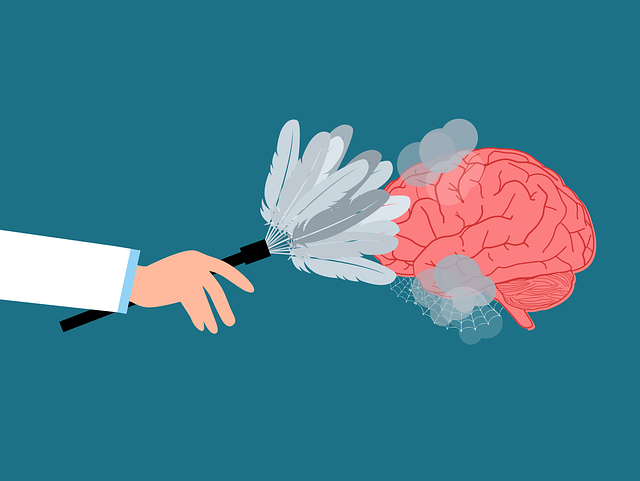Anxiety, a common stress response, becomes problematic when persistent. Lakewood Divorce Therapy offers support through Stress Management Workshops, Cognitive Behavioral Therapy (CBT), mindfulness techniques, and lifestyle changes like exercise, nutrition, and sleep. Their programs, including Mental Wellness Coaching and Healthcare Provider Training, provide tools for managing anxiety, improving relationships, work performance, and mental wellness, especially during life transitions like divorce.
Anxiety is a common struggle, but managing it effectively can lead to improved mental health. This comprehensive guide explores various techniques tailored to help you cope with anxiety, from understanding its signs and symptoms to powerful therapeutic approaches like Cognitive Behavioral Therapy (CBT). Discover lifestyle adjustments, mindfulness practices, and the valuable role of professional support, including therapists specializing in Lakewood Divorce Therapy.
- Understanding Anxiety: Recognizing the Signs and Symptoms
- Lifestyle Adjustments for Better Mental Health
- Cognitive Behavioral Therapy (CBT): A Powerful Tool
- Mindfulness and Relaxation Techniques to Calm Your Mind
- Professional Support: The Role of Therapists in Lakewood Divorce Therapy
Understanding Anxiety: Recognizing the Signs and Symptoms

Anxiety is a normal human response to stress, but when it becomes persistent and overwhelming, it can significantly impact daily life. Recognizing the signs and symptoms is the first step towards managing anxiety effectively. Common indicators include rapid heartbeat, breathing difficulties, restlessness, muscle tension, and a sense of dread or panic. These physical and emotional reactions may manifest in various ways, such as excessive worrying, avoidance behaviors, or even physical symptoms like headaches and fatigue. Understanding these signs is crucial when seeking Lakewood Divorce Therapy, as it enables individuals to identify when professional help is necessary.
The impact of anxiety can be profound, affecting not just the affected individual but also their relationships and overall mental wellness. Those experiencing prolonged anxiety may struggle in social settings, at work, or in intimate relationships. This is where Mental Wellness Coaching Programs Development and Healthcare Provider Cultural Competency Training can play a vital role in supporting individuals through stress management. By participating in Stress Management Workshops Organization, one can gain valuable tools to recognize and manage anxiety, fostering a healthier and more balanced lifestyle.
Lifestyle Adjustments for Better Mental Health

In navigating anxiety, lifestyle adjustments play a pivotal role in fostering better mental health. This includes adopting healthy habits such as regular exercise, balanced nutrition, and sufficient sleep. These foundational practices help regulate mood, improve cognitive function, and enhance overall well-being. For instance, engaging in physical activities like yoga or walking can reduce stress levels and promote relaxation, while maintaining a nutritious diet fuels the brain and body, contributing to mental clarity and resilience.
Additionally, social connections and support networks are invaluable. Building and nurturing relationships through social skills training and empathy-building strategies can provide a sense of belonging and reduce feelings of isolation. Crisis intervention guidance, too, offers tools to manage acute anxiety episodes, helping individuals navigate challenging situations with greater equanimity. Incorporating these lifestyle adjustments in conjunction with professional help, such as Lakewood Divorce Therapy, creates a comprehensive approach to managing anxiety effectively.
Cognitive Behavioral Therapy (CBT): A Powerful Tool

Cognitive Behavioral Therapy (CBT) has emerged as a powerful tool in the arsenal of anxiety management techniques. This evidence-based approach focuses on identifying and changing negative thought patterns and behaviors that contribute to anxiety disorders. By working with a trained therapist, individuals learn to challenge distorted thinking and develop healthier coping mechanisms, leading to significant reductions in anxiety symptoms.
In the context of Lakewood Divorce Therapy, CBT can be particularly effective for addressing the heightened stress and emotional turmoil often associated with separation or divorce. Through CBT, individuals gain insights into their thoughts and behaviors, enabling them to navigate challenging situations more effectively. This therapy not only aids in burnout prevention strategies for healthcare providers facing high-stress events but also promotes overall mental health education programs design, empowering individuals to take control of their well-being.
Mindfulness and Relaxation Techniques to Calm Your Mind

Anxiety can be a powerful force, but mastering mindfulness and relaxation techniques offers a profound way to regain control. Lakewood Divorce Therapy emphasizes the power of these strategies in managing stress and fostering resilience. By focusing on the present moment, individuals learn to quiet their minds and reduce anxious thoughts. Simple practices like deep breathing exercises or guided meditation allow one to disconnect from racing thoughts and find inner peace.
These techniques not only help in calming the mind but also contribute to overall well-being. Incorporating mindfulness into daily routines encourages positive thinking and coping skills development, enabling individuals to navigate challenging situations with greater ease. Through consistent practice, these tools become powerful allies in the journey towards a more balanced and serene state of mind.
Professional Support: The Role of Therapists in Lakewood Divorce Therapy

When navigating challenging life transitions like divorce, professional support from therapists specializing in Lakewood Divorce Therapy can be invaluable. These mental health professionals are equipped to provide a safe and non-judgmental space for individuals to process their emotions, understand underlying issues, and develop effective coping strategies. Through evidence-based approaches tailored to each client’s unique needs, therapists foster resilience and help individuals navigate the complexities of divorce with greater ease.
A crucial aspect of Lakewood Divorce Therapy involves comprehensive risk assessment for mental health professionals, ensuring the safety and well-being of both clients and practitioners. This careful evaluation allows therapists to anticipate potential challenges and tailor their support accordingly. Additionally, therapists often incorporate components of self-care routine development for better mental health, empowering individuals to maintain their own emotional equilibrium during this turbulent period. Well-designed mental health education programs can further equip both therapist and client with the knowledge and skills needed to navigate divorce’s complexities, ultimately enhancing the therapeutic experience.
Anxiety management is a holistic process that involves understanding, adjusting lifestyle, and seeking professional help when needed. By recognizing signs early and employing techniques like CBT, mindfulness, and relaxation, individuals can effectively navigate their mental health journey. For those in need of specialized support, Lakewood Divorce Therapy offers valuable resources, demonstrating that with the right tools and guidance, managing anxiety is achievable and transformative.














